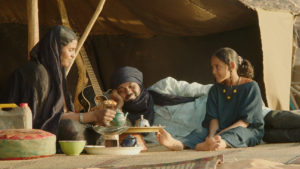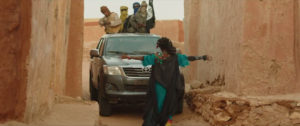Attend: Program Notes
Timbuktu | Abderrahmane Sissako | France, Mauritania | 2014 | 97 min.
Cinesthesia, Madison Public Library Central Branch, Thursday, August 2, 6:30pm»
A radical re-examination of Islamist fundamentalism, Abderrahmane Sissako’s complex, vibrant, and ravishing Timbuktu finds something poignantly human in the interwoven stories of a town occupied by jihadist invaders.
 Set in the titular ancient Malian desert city that was once a center of Islamic scholarship, art, literature and music, Timbuktu tells a timely, essential story of occupation and resistance. Veteran Mauritanian director Abderrahmane Sissako deftly weaves together several vignettes to create a rich mosaic portrait of daily life after jihadist invaders subject the townspeople to a perversely rigid interpretation of Shariah law. With subtle force and pinpoint clarity, Sissako effectively conveys the absurdity of terror in practice, while also finding unexpected beauty in the victims’ struggle and even humanizing the fundamentalists.
Set in the titular ancient Malian desert city that was once a center of Islamic scholarship, art, literature and music, Timbuktu tells a timely, essential story of occupation and resistance. Veteran Mauritanian director Abderrahmane Sissako deftly weaves together several vignettes to create a rich mosaic portrait of daily life after jihadist invaders subject the townspeople to a perversely rigid interpretation of Shariah law. With subtle force and pinpoint clarity, Sissako effectively conveys the absurdity of terror in practice, while also finding unexpected beauty in the victims’ struggle and even humanizing the fundamentalists.
A ragtag group of foreign fighters consisting mostly of Arabs from North Africa who are indifferent to local customs and who do not speak the native languages, the aggressors are at once brutal and ridiculous. They enforce bans on music, sports, tobacco, and public laughter, yet they often fail to live up to their own strict standards. For instance, they lightheartedly argue about their favorite soccer games and one of the leaders, Abdelkrim (Abel Jafri), sneaks off behind a dune to smoke a cigarette. Timbuktu comes alive precisely because Sissako’s film depicts the militants in novelistic detail as vividly three-dimensional characters. “To portray a jihadist as simply a bad guy, who does not in any way resemble me, who’s completely different, that’s not completely true,” Sissako told The New York Times. “The jihadist is also … a fragile being. And fragility is an element that can make anybody tip over into horror.”
 A complex, ambivalent and multifaceted look at the causes, consequences and contradictions of Islamist extremism, Timbuktu challenges viewers to discover something poignantly human in the drama that unfolds. With one striking tableau after another, Sissako quietly ravishes our senses and presents a tragic yet hopeful vision of a people under siege, while also giving us room to breathe. The film lingers on idyllic moments of everyday pleasure and simple acts of defiance that affirm the spirit of free will. In a particularly moving scene, a group of boys joyfully play soccer on a dusty field with an imaginary ball.
A complex, ambivalent and multifaceted look at the causes, consequences and contradictions of Islamist extremism, Timbuktu challenges viewers to discover something poignantly human in the drama that unfolds. With one striking tableau after another, Sissako quietly ravishes our senses and presents a tragic yet hopeful vision of a people under siege, while also giving us room to breathe. The film lingers on idyllic moments of everyday pleasure and simple acts of defiance that affirm the spirit of free will. In a particularly moving scene, a group of boys joyfully play soccer on a dusty field with an imaginary ball.
Although Sissako’s film may be far from a comedy, Timbuktu maintains a delicate balance between solemnity and playfulness. Amid injustice, repression and ruthlessness, Timbuktu incorporates furtive touches of humor that undermine our psychological defenses, therefore rendering the film’s abrupt tonal shifts all the more disturbing. Sissako does not shy away from displaying violence, but he never sensationalizes any of these events. He shows us cruel punishments discreetly, while persistently reminding us that individuals with their own motivations and internal conflicts, rather than faceless monsters, commit such acts. In an interview for The Guardian, Sissako explains why he dared to portray jihadists in a new light. “The most terrible thing about this is that they are people like us. It’s always hard to say. But they are. It’s the only film of my own that makes me cry. I’ve cried several times watching it.”
The inspiration for Timbuktu was a horrific incident that occurred on July 29, 2012. A young man and woman were abducted in Aguelhok, northern Mali, by an Islamist group that had recently occupied the village. Accused of having children outside of marriage, the couple were buried up to their necks and stoned to death. Sissako, a Muslim who was born in Mauritania and raised in Mali, began working on a movie about the takeover of a town by jihadists the next year, seeking to draw attention to this atrocity.
He had made initial preparations to shoot in Timbuktu. For months, Ansar Dine, or Defenders of the Faith, had advanced through Mali, attempting to impose Shariah law, but by then the French military had intervened. Just before filming began, a checkpoint near the airport was struck by a suicide bomber. Consequently, the entire production moved across the border into Mauritania. Sissako planned to make Timbuktu as a documentary, but he realized it would be impossible when most of the killers were still at large. “You can’t make a documentary where people aren’t free to speak,” Sissako maintains. “And the risk is that you make a film for the jihadists – because they’re the ones who are going to do the talking.”
Ironically, following the Charlie Hebdo shootings in January 2015, the mayor of Villiers-sur-Marne, a suburb of Paris, called Timbuktu “an apology for terrorism” and briefly succeeded in banning it from a local cinema, although he had not seen the film. Timbuktu was also withdrawn from the pan-African FESPACO film festival in Burkina Faso for “security” reasons. Despite the controversy surrounding it, Timbuktu was nominated for Best Foreign Film at the 2015 Academy Awards and won seven César Awards (the French Oscar equivalent), including Best Film, Director, Writer, Cinematography, and Music.
Sissako’s unprecedented portrayal of jihadists offers a radical alternative to typical representations of terrorism in our mass-media dominated global culture. The even-handedness at the heart of Timbuktu imbues his film with a pervasive sense of ambiguity that necessitates the active participation of viewers.
Timbuktu never feels didactic since Sissako refuses to provide clear resolutions or facile moral judgments. Far from defending, excusing, or justifying the behavior of extremists, he delivers a powerful statement against the political violence that, in his own words, “makes Islam into something imaginary.” At the same time, he captures the essence of a complex situation and offers insight into universal human nature. By attempting to understand the perspective of the jihadists rather than condemning their actions outright, Sissako’s unflinching, compassionate and lyrical work of art arouses more than just righteous anger and ultimately rejects the kind of narrow-mindedness that fuels fundamentalism.